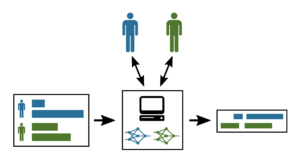Cooperative Personnel Scheduling (Research Project)
a joined research project from the Algorithms and Complexity Group, TU Wien, Austria, and Honda Research Institute, Germany
Project Team
Topic
In classical personnel scheduling, the employees of a company are assigned their schedules, which determine at which times they work to fulfill some kind of demand. Our setting is slightly different. Each employee also referred to as a user, has some jobs to complete that need a specific resource. Only a limited amount of resources is available and only one job can use a resource at a time. Each job has to be assigned to a resource and a timespan in which the job is carried out. Furthermore, users will have preferences on when their jobs should be executed. These preferences have to be collected in some way. One possibility would be to let the employees specify their full preferences in the beginning. But this is tedious for the employees, error-prone and only allows for preferences that were explicitly considered when designing the algorithm.
In this project, we will develop and investigate a framework that learns these preferences over time through a limited amount of user interactions. The framework aims to construct schedules that respect employees' preferences and are feasible with the given restrictions. While constructing the schedules it is allowed to ask the employees a limited number of questions regarding their preferences. The responses to these questions are used to model the employees' preferences. The framework may also consider fairness, e.g. by balancing the number of user interactions among the employees. Research questions to answer include which algorithms work well for the occurring problems, how to model the employees' preferences, and which kind of user interaction gives sufficient information on the preferences, without overwhelming the employees.







